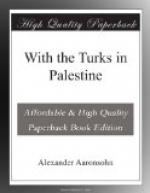Sure enough, a few days later Fewzi Bey was summoned to Jerusalem; at the same time the “commission,” which had dwindled to one single officer on secret mission, put in an appearance and began to make inquiries among the natives. He got little satisfaction at first, for they lived in mortal terror of the outlaw; they grew bolder, however, when they learned his purpose. Complaints and testimonies came pouring in, and in four days the officer had the names of hundreds of witnesses, establishing no less than fifty-two crimes of the most serious nature. Fewzi’s friends and relatives, in the mean while, were doing their utmost to stem the tide of accusations. The Kaimakam (lieutenant-governor) of Haifa came in person to our village and threatened the elders with all sorts of severities if they did not retract the charges they had made. But they stood firm. Had not Djemal Pasha, commander-in-chief of the armies in Palestine, given his word of honor that we should have redress?
We were soon shown the depth of our naivete in fancying that justice could be done in Turkey by a Turk. Fewzi Bey came back from Jerusalem, not in convict’s clothes, but in the uniform of a Turkish officer! Djemal Pasha had commissioned him commandant of the Moujahaddeen (religious militia) of the entire region! It was bad enough to stand him as an outlaw; now we had to submit to him as an officer. He came riding into our village daily, ordering everybody about and picking me out for distinguished spitefulness.
My position soon became unbearable. I was, of course, known as the organizer of the young men’s union which for so long had put up a spirited resistance to Fewzi; I was still looked upon as a leader of the younger spirits, and I knew that sooner or later Fewzi would try to make good his threat, often repeated, that he would “shoot me like a dog.” It was hardly likely that an open attempt on my life would be made. When Ambassador Morgenthau visited Palestine, he had stayed in our village and given my family the evidence of his sincere friendship. These things count in the East, and I soon got the reputation of having influential friends. However, there were other ways of disposing of me. One evening, about sunset, while I was riding through a valley near our village, my horse shied violently in passing a clump of bushes. I gave him the spur and turned and rode toward the bushes just in time to see a horseman dash out wildly with a rifle across his saddle. I kept the incident to myself, but I was more cautious and kept my eyes open wherever I went. One afternoon, a fortnight later, as I was riding to Hedera, another Jewish village, two hours’ ride away, a shot was fired from behind a sand-dune. The bullet burned a hole in the lapel of my coat.




